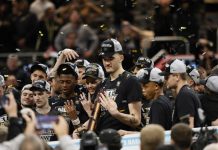Minutes after Italy’s Luna Rossa Prada Pirelli Team sailed across the finish line to earn a spot in the America’s Cup match, Francesco “Checco” Bruni popped up from the port cockpit, crossed over to the starboard side of the stylish black boat, gave a double thumbs up and hugged co-helmsman Jimmy Spithill.
Spithill, an Australian, was matter-of-fact. Bruni, an Italian, was ecstatic.
“Fantastico, fantastico, bellissimo, bellissimo (fantastic, fantastic, very beautiful, very beautiful),” Bruni shouted. “We are different, Australians and Italians, very different.”
Different, yes, but they’ve formed quite the tandem in steering Luna Rossa into the 36th America’s Cup match against defending champion Emirates Team New Zealand. Delayed four days by a small community outbreak of COVID-19, the best-of-13 match will begin Wednesday, New Zealand time.
Ultimately, the fastest boat will win the Auld Mug. But Luna Rossa has made a splash with its unique dual helmsman system. Devised in the early days of the campaign, Luna Rossa’s system puts the boat in the hands of two of the world’s best sailors as the powerful 75-foot yacht speeds over the Hauraki Gulf on hydrofoils.
On the other boats, the helmsman has to dash around the back of the mainsail to the other side of the boat when it tacks or jibes. But on Luna Rossa, Bruni and Spithill stay put. Bruni steers on port tack and Spithill steers on starboard tack. When one has the wheel, the other serves as the flight controller and trims the foils.
Not having the helmsman change sides helps reduce drag.
“Aerodynamics on this boat are a huge thing, and we believe having a guy move from one side to the other wasn’t great,” team director and skipper Max Sirena said. “It’s more windage from an aerodynamic perspective, and also we had two great helmsmen, two great match racers. It was almost obvious that we did that.”
Luna Rossa is in the America’s Cup match for the second time in 21 years. This is a personal rematch for the 41-year-old Spithill. In 2017, his Oracle Team USA was routed by Team New Zealand and helmsman Peter Burling. In 2013, Spithill skippered Oracle Team USA to one of the greatest comebacks in sports, winning eight straight races to beat Dean Barker and the Kiwis 9-8 for the U.S. team’s second straight Cup win.
Having Bruni and Spithill staying put and not changing sides does make that big of a difference.
“The boats are doing almost 100 kph (62 mph) now, and if it’s doing, let’s say, 80 kph (50 mph) and in 20-25 kph (12-15 mph) of wind, you’re basically in a hurricane,” said Spithill, who’s in his fourth straight match. “Even if you’re just up in that wind in that sort of speed for more than a few seconds, that’s a considerable amount of drag. You try standing on the roof of your car doing 100 kph, you’ll feel some serious drag.”
Reducing drag is important, whether it involves components of the boat or placement of the sailors. Luna Rossa knew there would be tradeoffs and have refined them as the racing has progressed.
“I think so far it’s working,” Spithill said. “We’re always trying to improve it. We’re just trying to make it as efficient as we can.”
Bruni and Spithill were crewmates with Luna Rossa in the 2007 challenger trials.
“Now, sharing the helmsman’s role has definitely given us more opportunities to compare and learn from each other,” said Bruni, 47, a three-time Olympian and a world champion in various classes. “I love steering the boat with Jimmy. It is an interesting and new experience that has been very formative. I have been learning a lot from him.”
As Luna Rossa progressed through the Prada Cup for challengers, winning the semifinal against American Magic and then the final against INEOS Team UK, Spithill and Bruni began involving mainsheet trimmer Pietro Sibello more in the decision-making. Depending on the maneuver, Sibello sometimes changes sides.
“Funny enough, on our boat, he’s the only guy who sees the entire race,” Spithill said. “He’s the only guy on board who actually swaps sides. Everyone else, the starboard side of the boat, we have a helmsman and our grinders. And same with the port side. It’s kind of like an NFL team. You’ve got your defense and your offense. We’ve got our two squads on the boat.”
Sibello now helps paint the full picture for Bruni and Spithill, looking for wind pressure and helping make decisions.
“That to me has probably been the missing piece at the beginning that now that we’re doing it has really helped strengthen this combination,” Spithill said.




